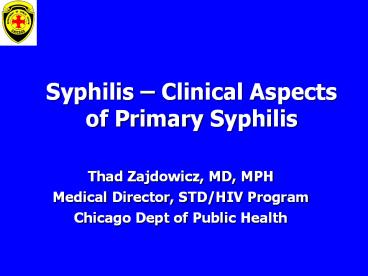Syphilis - PowerPoint PPT Presentation
Title:
Syphilis
Description:
Medical Director, STD/HIV Program. Chicago Dept of ... 'Kissing' Chancres 'Kissing' Chancres. Perianal Chancre. Chancre of the Tongue. Oral Chancre - Lip ... – PowerPoint PPT presentation
Number of Views:884
Avg rating:3.0/5.0
Title: Syphilis
1
Syphilis Clinical Aspects of Primary
Syphilis
- Thad Zajdowicz, MD, MPH
- Medical Director, STD/HIV Program
- Chicago Dept of Public Health
2
(No Transcript)
3
Why a lecture on syphilis? Although
syphilis is an eminently treatable disease, its
continuing occurrence illustrates that our
control efforts still need to be improved. The
disease remains elusive clinically even today,
and unless thought of and sought for can silently
cause disease as it has for centuries. Further,
control of syphilis is vital because of its
interactions with HIV. This lecture will focus
on primary syphilis.
4
Objectives
- To review the pathogenesis of primary syphilis
- To demonstrate the clinical features of primary
syphilis - To illustrate clinical variants of primary
syphilis
5
Clinical Stages
- Syphilis is conventionally divided into several
stages - Primary
- Secondary
- Latent
- Late, or tertiary
- This lecture will focus on primary syphilis
6
Treponema pallidum
7
Pathogenesis
- Infectious dose unknown in humans
- In rabbits, experimental infection induced with
as few as 4 spirochetes - Estimated average inoculum 500-1000 in humans
- Inoculation may occur at any body site
- Eternal genitalia most frequent
- Mouth, anus, cervix quite common
- Other sites also well described
8
Pathogenesis
- T. pallidum divides every 30-33 hrs
- Incubation period
- Primary syphilis median 21 days, range 3-90
days - The most prominent histopathological findings are
arteritis and periarteritis in affected tissues
9
Primary syphilis - chancre
10
Chancre characteristics
- Indolent, punched out appearance
- Indurated
- Painless
- Raised border
- Red, smooth base
- Scant serous secretions
11
Chancre characteristics
- Chancre usually solitary, but multiple lesions
can occur - May occur at any site in the genital tract
- coronal sulcus, glans, frenum, prepuce, shaft of
penis, anorectal area, fourchette, vulva, cervix - May occur in the oropharyngeal area
- lip, tongue, tonsil
- And may occur wherever treponemes are inoculated
12
Penile Chancre
13
Penile Chancre
14
Penile Chancre
15
Rolled Edges
16
Crusted Chancre
17
Chancres 18th Century
18
Multiple Chancres
19
Primary Chancre - Labial
20
Kissing Chancres
21
Kissing Chancres
22
Perianal Chancre
23
Chancre of the Tongue
24
Oral Chancre - Lip
25
Chancre of Hard Palate
26
Chancre of the Lip
27
Facial Chancre
28
Facial Chancre
29
Digital Chancre
30
Conclusions
- The typical primary syphilitic chancre is
solitary, indurated, and painless, but many
clinical variants occur - Most chancres are genital, oral, or perianal, but
may occur anywhere T. pallidum is inoculated - The primary histopathology seen in syphilis is
arteritis and periarteritis
31
Sources of Information
The following sites are useful if more
information on syphilis is sought www.cdc.gov C
enters for Disease Control www.who.int World
Health Organization www.ashastd.org American
Social Hygiene Assoc www.vnh.org Virtual Naval
Hospital































